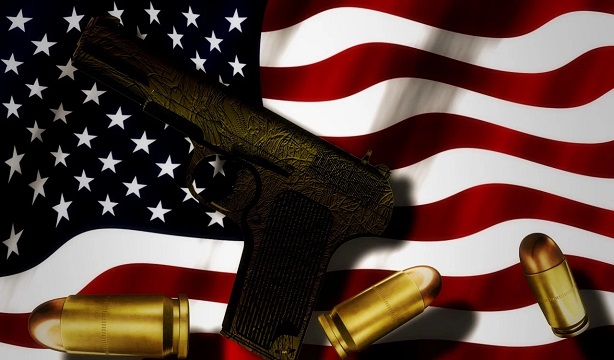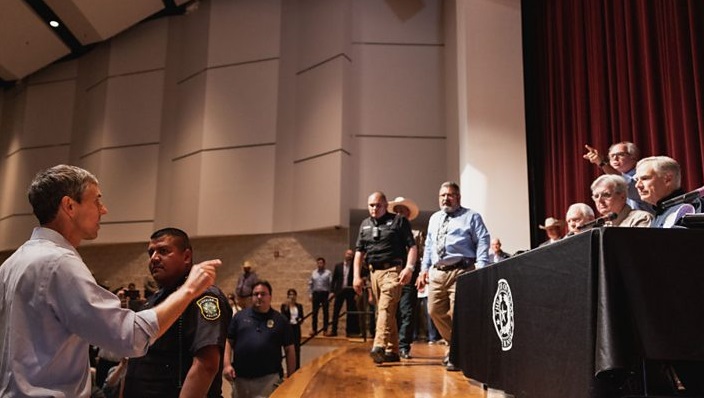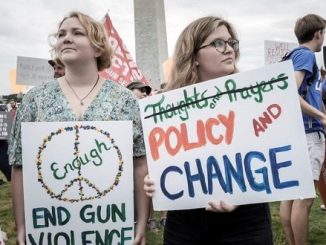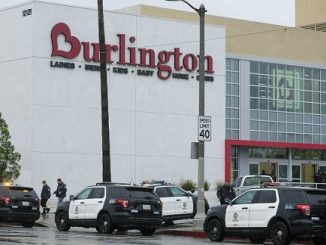
The school shooting in Uvalde, Texas, has led to renewed calls for action on gun control. But familiar obstacles – and some new ones – will make any reform difficult.
Nearly a decade after a young man shot and killed 26 people, including 20 children, at Sandy Hook elementary school in Newtown, Connecticut, a similar tragedy unfolded at an elementary school in Uvalde, Texas.
The Sandy Hook shooting prompted calls for national gun reform and led to an emotional plea for action from US President Barack Obama. But efforts to advance gun-control legislation in Congress stalled.
Now, following the deaths of 19 children and two adults in Uvalde, there are similar calls for action from national politicians. President Joe Biden has echoed Mr Obama in pleading for change.
“Why are we willing to live with this carnage?” he said. “Why do we keep letting this happen? Where in God’s name is our backbone to have the courage to deal with it and stand up to the lobbies?”
Even though Democrats control both chambers of Congress and the presidency this time around, efforts to pass new gun-control regulations are facing similar challenges – and new ones that may be even more formidable.
Here’s a look at some potential courses of action and the obstacles they will have to surmount.
Old roadblocks in Congress
In the weeks after Sandy Hook, a majority of US senators supported passing legislation requiring expanded background checks for gun purchases. Because of the filibuster – a parliamentary procedure that requires at least 60 votes in the 100-seat Senate to pass most legislation – a simple majority was not enough, however.
Today, only a handful of the 50 Republican senators today appear open to new gun legislation, suggesting any new efforts will meet a similar fate.
That hasn’t stopped Democrats from considering new proposals and offering to work with Republicans to find any common ground.
“I think it’s a slim prospect, very slim, all too slim,” Democratic Senate Majority Leader Chuck Schumer said of changes of success on Thursday. “We’ve been burnt so many times before.”
So far, the only Republican-backed offering has been to create a national database of school safety practices.
Conversations about doing more have begun, however, and a handful of Republicans have been participating. Proposals with the greatest support include a “red flag” law that would prevent individuals with mental illness or a criminal history from purchasing firearms and expanded background checks on gun purchasers that would include private gun sales.
Although polls indicate majorities of Americans support such efforts, many Republican senators represent states with large pro-gun communities. And the Republican voters whose support they need to win primary elections (the selection process within each party) are even more opposed to reform. So unless sentiment shifts among that constituency, the Republicans are unlikely to change course.
And even if this proposed legislation passes, it may be an imperfect solution. There are mass shootings that red-flag laws and background checks haven’t prevented – and they wouldn’t do anything to reduce the 393 million firearms currently in the US
States pressing ahead
Although congressional efforts were stymied in 2015, gun-control activists made substantive progress in passing new laws at the state level.
In Connecticut, for instance, there was overwhelming support for reform from the communities still reeling from the brutality of the Sandy Hook attack. Other Democratic-controlled states – like New York, Maryland and California – passed their own legislation, closing gun-show loopholes, limiting magazine sizes and prohibiting the sale of certain types of firearms.
In Vermont in 2018, after a school-shooting plot was narrowly averted, Republican Governor Phil Scott reversed his position and worked with Democrats to pass new legislation in the traditionally gun-friendly state. The law, which included raising the age to buy a firearm to 21, limiting magazine sizes and requiring new background checks, angered many of his previous supporters on the right. He easily won re-election in 2018, however.
But the states that have the political majorities to pass gun-control regulations have already done so. And in many Republican controlled states, the momentum on the gun issue is towards less regulation, not more. In April, Georgia became the 25th state – all Republican – to allow its residents to carry a concealed handgun without a government license.
Democratic politicians in those states, frustrated by the lack of action, may cite the Uvalde massacre as reason to act. Former congressman Beto O’Rourke, the Democrat running for Texas governor in November, voiced the anger many on the left feel in conservative states as he confronted Republican Governor Greg Abbott at a press conference in Uvalde on Wednesday.
Mr O’Rourke spoke to reporters after the event and listed banning assault weapon sales, universal background checks, red-flag laws and safe gun-storage laws as steps his state could take in the wake of the attack.
While many of those provisions have popular support, all will be difficult to pass in Texas. The more likely response there will be increased funding for law enforcement and school security measures, such as Texas Attorney General Ken Paxton’s call for giving more guns to teachers.
Courts are another battleground
Even if the political calculus changes in Congress or among the states like Texas that have been reluctant or outright hostile to enacting gun-control legislation, there is a significant and growing obstacle to any attempts at reform – the courts.
In 2008, a narrow 5-to-4 majority in the US Supreme Court ruled that the Second Amendment to the US Constitution, which says “the right of the people to keep and bear arms shall not be infringed”, guarantees a personal right to possess a handgun. That interpretation, although subject to furious debate, has embedded gun ownership rights in the text of the Constitution itself. And since that decision, the courts have only become more supportive.
One of President Donald Trump’s lasting legacies was to appoint hundreds of conservative judges to the federal courts, including naming three new Supreme Court justices. Two weeks ago, two Trump-appointed appellate-court judges in California struck down a state law prohibiting the sale of assault rifles to those under the age of 21.
That opinion, if upheld by the Supreme Court, could be of particular relevance given that the perpetrators in Uvalde, Sandy Hook and the recent shooting in Buffalo all fall into that category.
“America would not exist without the heroism of the young adults who fought and died in our revolutionary army,” one of the judges wrote. “Today we reaffirm that our constitution still protects the right that enabled their sacrifice – the right of young adults to keep and bear arms.”
The Supreme Court appears poised to strike down a New York law that restricts who may obtain concealed handgun licences in the next month, perhaps endangering similar laws in other states.
With gun laws already on the books being ruled unconstitutional, it appears likely that any new laws will face legal challenges as well – and may not survive long.
Texas shooting: More coverage
- LATEST: Police urged to end US school shooting
- TIMELINE: How a sunny school day ended in bloodshed
- VICTIMS: ‘The sweetest little boy I’ve ever known’
- ANALYSIS: America’s bitter debate that never goes away
- SANDY HOOK: Texas shooting opens painful memories
Source: bbc.co.uk







Be the first to comment